- Home
- A. J. Hartley
What Time Devours Page 2
What Time Devours Read online
Page 2
Thomas had been his English teacher. He couldn’t remember what they had studied that year. Julius Caesar? As soon as the title came to mind he was sure it was right, sure also that Williams had taken the lead in organizing a staging of two or three scenes from the play. The memory came back so powerfully that Thomas couldn’t believe he had forgotten it, or the charismatic kid at its core. Williams had played Mark Antony. Thomas thought they had done the assassination scene and its immediate aftermath, maybe even both sets of funeral orations, but the only thing he could recall clearly was Ben Williams talking to the class as the people of Rome:
The evil that men do lives after them;
The good is oft interred with their bones;
So let it be with Caesar. The noble Brutus
Hath told you Caesar was ambitious:
If it were so, it was a grievous fault,
And grievously hath Caesar answer’d it.
Here, under leave of Brutus and the rest—
For Brutus is an honourable man;
So are they all, all honourable men—
Come I to speak in Caesar’s funeral.
Thomas was surprised at how well he recalled the lines, but
had forgotten—or half forgotten—the boy who had made
them memorable.
Twenty-three. If he had merely read about this in the paper, if he had never known Williams, the memorial service might have produced a private diatribe about the war, but he felt no outrage, only loss and futility. He started to frame thoughts of Williams’s frustrated potential but pushed them away as clichéd. He wanted a stronger connection to his former pupil but couldn’t grasp enough of him beyond that classroom Caesar to make the boy real. He thought of Williams but found that his own thirty-eight years weighed too heavily on him. At twenty-three he had been teaching in Japan, had not even been to graduate school yet. He had already met Kumi, had already fallen in love with her, in fact. Twenty-three.
Strange, he thought, that so much of who you are was already in place so early.
He remembered it all, the scent of his apartment in Japan, the feel of the bicycle he had ridden every day, the thrill of visiting Kumi. It was so long ago, but felt so fresh that he smiled as if he were still there in that moment, as if he had not dropped out of graduate school, had not separated from his wife, and had not found a body at his kitchen window. He stared at his hands as they sat at ten and two on the steering wheel: big hands, they were. Strong. But the skin was tougher than it had been, not quite as smooth. He looked back to the church and wondered if losing a former student was at all like outliving your own children.
Amazing, he thought, the way you can make everything about you . . .
“Nature of the beast,” he said aloud.
“The beast” being?
Life, he supposed.
He sat there, replaying all he could dredge up about Ben Williams, and watched the kids filing out to cars and yellow buses, while Ben Williams’s former classmates hugged, shook hands, and swore to keep in touch.
CHAPTER 3
By evening, the morning’s horror seemed a world away and he was not entirely surprised to find the house deserted when he got there, the only sign of the investigation being a mass of yellow tape designed to keep people away from where the corpse had been, and a squad car down the block. A couple of uniforms were going house to house. He had almost forgotten what had happened, pushed it into some dark part of his mind and tried not to look at it. Now he was back, and it was real again. As he walked up the path to his front door, something of his former nausea returned.
Inside, Thomas had another glass of water, reached for the phone, dialed a sixteen-digit number, and waited.
“Hello, Tom,” said Kumi.
“You don’t say moshi moshi anymore,” he said, smiling.
“Not to you,” she said. “You are the only person who calls at this ungodly hour.”
“So how’s Tokyo?” he said, the sound of her voice unwinding him like a hot bath.
“Oh, you know, the usual. The State Department wants to involve me in intellectual property issues with China, about which I know nothing.”
“And they understand that you speak Japanese, which is not the same as Chinese?”
“Yeah, they got a research grant.”
“So why you?”
“Who knows. They think I look friendly.”
“Boy, do they not know you,” said Thomas.
“No one knows me like you do, Tom,” she said, wry as ever. “Or at least there are bits of me that only you see.”
“I should hope so,” said Thomas.
“That’s not what I meant,” she said. “You have a mind like . . .”
“A graduate student?”
“I guess so,” she said. “Aren’t you getting a bit old for that?”
“Probably,” he said. “But sometimes it feels like I only really knew you in my twenties.”
He thought he heard her sigh. For years they had been separated, furiously so. Now they were at least speaking again, perhaps more than that, though it was hard to be sure. They had never stopped being married, at least technically.
“How are your classes?” he asked.
Kumi had decided that since she was going to be in Japan, she might as well tap into her cultural heritage. She had signed up for three courses, karate, traditional Japanese cooking, and ikebana: flower arranging. That had been the first to go.
“Those women drove me nuts,” she had said. “Everything had to be just so. And there was only one way of doing it. They’re sticking two bits of bamboo and a camellia flower on a rock and they act like they’re defusing a tactical nuclear missile. They’d look at mine and say, ‘This is incorrect.’ Incorrect? It’s flower arranging! I had to get out before I killed someone.”
That had been two weeks ago.
“Not sure how long the karate is going to last,” she said tonight. “They say I’m unfocused, too aggressive.”
Thomas chuckled.
“Laugh it up, English teacher,” she said. “I’ll come by there and kick your ass.”
“When?” he said.
“When I’ve mastered rolling my sushi,” she said. “I’m better at that. The Zen thing makes more sense when you’re making rice and seaweed snacks than when someone is trying to kick you in the head. Go figure.”
“Listen,” he said. “Something happened and I need to talk to you.”
He told her about the dead woman and she asked the right questions until he had no more answers, and there was a silence. Then he told her about Ben Williams’s memorial service.
“I don’t think you ever mentioned him before,” she said.
It wasn’t supposed to be a criticism, but Thomas bristled.
“You weren’t talking to me then, remember?”
“It takes two to . . . I don’t know,” she said. “Whatever the opposite of ‘tango’ is.”
“True,” he admitted.
“I’m sorry I can’t come back to the States right now, Tom.”
“Oh, I know,” said Thomas, pleased that she would even consider it. “I’m not sure which bothered me more, the murder or the memorial service. He died at the same age I was when we met.”
“Yes?”
“Makes you think, doesn’t it,” he said. The hollowness of the phrase stung him into saying more. “I mean, makes you realize how little time you have—or might have—how much you should . . .”
“Seize the day?”
“Something like that, yes.”
“Are you okay, Tom?”
“Yes,” he said. “Sorry. I’m just feeling . . . melancholy, I guess. I’m thirty-eight, Kumi, you know? Thirty-eight. That makes me about halfway through.”
“Halfway through what?”
“Life,” he said. “I mean, given average life expectancy. More than halfway if something happens . . .”
“Oh, this is a cheery conversation,” she said.
“Sorry.”
“I’m sorry I’m not there, Tom, but you didn’t want me back before.”
“Not true,” said Thomas. “I did, even if I didn’t know it.”
She laughed at that, and he pressed what he took to be an advantage.
“So how long are we talking? Six months? A year?”
“Tom,” she said, and there was that caution again, that refusal to get caught up in him, in them. “I’m not sure. I can’t think about it right now. This project I’m working on is starting to show some real promise. I complain about my job but it’s a part of me. Between you and me, I’m actually pretty good at it, and most of the time, I love it. Let me get this assignment off my desk and then we’ll talk. Promise.”
“Weeks?”
“Two. Maybe three.”
“Okay.”
“Good,” she said. She laughed, a short exhaling sound that blew the tension out of her chest, a noise so familiar he could almost see it, and he knew what it meant. It was relief, joyous and grateful, and he knew she had been steeling herself to tell him she wasn’t coming yet, wasn’t even ready to discuss it, long before he had called.
“Okay,” he said again, wondering when he would see her next, wondering also why these calls always made him feel like a contestant on a game show, the one who comes in second and goes home with the kinds of consolation prizes you either already have or never wanted. “I just want you here again.”
“Soon,” she said. “Promise.”
CHAPTER 4
Thomas was clearing out the book-filled lumber room that he mockingly called his library when the phone rang. He read novels obsessively all year round. Even after hours of grading papers he would curl up in a corner with a glass of something and a book, till he could barely keep his eyes open. It was what he did. He read slowly, weighing each phrase in his mind no matter how pulpy the genre, and always finished, even if it took weeks, regardless of how bad the book was. Every third book was, he decided, a waste of his time, and though he could usually predict which those would be inside a few pages—as he could usually predict what grade a student paper would get inside the first paragraph—he couldn’t put them aside. It was, he thought, as he set down a stack of pristine paperbacks and went looking for the phone, a fault of which he was secretly and absurdly proud.
“So how’ve you been, Mr. Knight?”
The voice was odd.
“Fine,” said Thomas, reflexively. “Who’s this?”
“It’s David Escolme. You’ve probably forgotten me.”
“Not at all, David,” said Thomas, thinking that he had, in fact, forgotten him right up to the moment the phone rang.
David Escolme had been a student of his, what? Ten years ago? Something like that. Before Ben Williams for sure. And unlike Williams, Escolme had been a geeky, acne-faced kid, unathletic, socially awkward, and a bit too clever for his own good. They had talked about music, what used to be called alternative rock and its various forebears, from grunge to those older, quirky, tough-to-categorize bands like XTC. In fact, Escolme had been the one to introduce Thomas to some of those groups, and had made a gift of one of XTC’s albums to him when he left school. Thomas still played it from time to time.
As if hearing his thoughts, Escolme said, “You still listening to music?”
“Some,” said Thomas. “I’m a bit out of touch these days. Still playing the same stuff I did when you were here, probably.”
“And reading Sherlock Holmes? You introduced me to him, remember?”
Thomas didn’t remember, and hadn’t read Conan Doyle for years. Escolme didn’t wait to hear his answer but quoted in a ludicrous British accent.
“You see but you do not observe! Great stuff. Do you remember the TV version with Jeremy Brett? Awesome.”
“They were good,” agreed Thomas.
It was more than a surprise to hear from Escolme after all these years. There was something strange about it. Underneath the young man’s hurried explanations about how he had come to look up his old high school English teacher, behind the amiable banter about the years since last they spoke, there was something calculated. He sounded like he was working from a script, not with the bored detachment of the telemarketer, but with a studied nonchalance, like an actor trying to pass off as spontaneous what was actually memorized.
“Did you know Ben Williams?” Thomas asked.
“No,” said Escolme. “Read about him last week. It was the memorial today, right?”
“Right.”
“Tough break.”
The inadequacy of the remark irritated Thomas, and he decided to press the conversation to a close.
“Was there something particular on your mind, David?” he asked.
“Well, it’s a funny thing,” the voice was saying over what seemed to be a cell phone line, smiling as if it really were funny, though Thomas didn’t believe him. “I didn’t really know who else to turn to. I know it’s been years, and we’ve sort of lost touch, but I mean . . . Who else do I know who reads Shakespeare?”
Thomas frowned.
“Shakespeare?” he said.
“Yes,” he said. “I need a little help with Shakespeare.”
He was almost giggling at the obvious absurdity of the request, and Thomas wondered for a moment if the whole thing was some kind of practical joke. Maybe there were a bunch of them, fresh from the memorial, huddled around a phone trying not to explode with laughter as they prank-called their old teacher . . .
“You must know other people who read Shakespeare, David,” said Thomas.
“Maybe,” said Escolme, not even bothering to dodge, “but you were doing a doctorate on him, right? I remember that. That’s why you were such a good teacher.”
Thomas smiled at the non sequitur.
“I never finished,” he said, “and that was all a long time ago. Why don’t you talk to someone in the English department at . . . Where did you go to school again?”
“BU!” he said, momentarily genuine in his surprise. “You helped get me in, remember?”
“Of course,” said Thomas. Boston University: his old alma mater, from which he had finally fled to teach high school back in Chicago, trying to shut out his professors’ mutterings about wasted talent as he had shut out the groaning fault line on which his marriage sat.
That was a long time ago.
And the ground beneath his marriage had stopped shifting. For now. Thomas’s mind went back to the conversation he had had with Kumi, and he wondered vaguely when he would see her again.
“Anyway,” Escolme was saying, “I didn’t get real friendly with the faculty there.”
“What about Randall Dagenhart?” said Thomas. “Is he still there?”
“I guess,” said Escolme, a little too quickly. “I had a class with him but it was one of those huge lectures. He didn’t even grade my papers. In the end, I spent more time with the theater guys. Anyway, I trust you.”
There it was again, that edgy nervousness. Thomas didn’t like it.
“Thanks, but . . . ,” he began.
“I’m serious,” said Escolme. “This is serious.”
And then he inserted a little autobiographical news to prove it was serious. Escolme’s news—that he had since completed a master’s degree in English, then worked for a boutique literary agency before being head-hunted into one of the largest literary management companies in the country—was surprising only because it made clear what such conversations always made clear, that the time had slipped unnoticed away. Thomas knew nothing about the world of publishing, but he had heard of Vernon Fredericks Literary, if only for their movie division whose agents were routinely thanked on Oscar night.
“I don’t understand what that has to do with Shakespeare,” said Thomas. “Or with me, frankly.”
“Mr. Knight,” he said. “I promise. This is not like anything you’ve dealt with before. Honestly. I want it to be you.”
Thomas paused.
“To do what?” he said.
; “I have to show you. I’m at the Drake. Room 304.”
Thomas suddenly felt weary beyond words. He wanted to say that he had spent a miserable and horrific day dealing with the corpse he had found propped up against his kitchen window, but even the idea of saying such things made him want to forget them. He paused and then said simply,
“When?”
CHAPTER 5
As soon as he had hung up, he Googled “Escolme, Vernon Fredericks Literary.” Thomas wasn’t sure what he expected to find: a story in the Tribune, perhaps, local boy makes good. Something like that. What he found was a professional-looking website, all cool blues and grays, surrounding a similarly professional blurb about the literary awards won by its (unnamed) “talent” along with a set of submission guidelines. At the bottom of the page, it listed VFL’s locations: New York, London, Beverly Hills, Tokyo, and Nashville. No Chicago branch. Thomas clicked the New York link and found a roster of agents.
David Escolme was two-thirds down the list.
There was a picture. The boy Thomas had known was still recognizable, but only just. The acne was gone, the eighties glasses had been replaced by sleek black frames with oblong lenses, and the boy was now a man, smiling confidently into the camera. He looked comfortable in his elegant suit, a man for whom the slings and arrows of adolescence had long since glanced off and been forgotten, a man immune to the future. It was the face of a businessman.
Nothing wrong with that, he reminded himself. And let’s see if we can spare him your tiresome lectures on the state of the arts in America, shall we?
He grinned sheepishly to himself and his gaze fell on the kitchen window. The evening light was dwindling fast and the window was like a hole into the swelling night, a picture frame whose canvas had been slit out. For a second he saw the dead woman’s face as clearly as if she was still there, her staring eyes (one green, one violet) turned blank upon him.

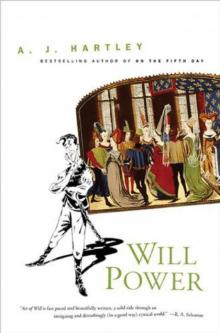 Will Power wh-2
Will Power wh-2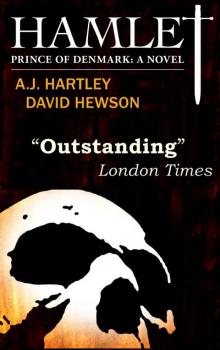 Hamlet, Prince of Denmark
Hamlet, Prince of Denmark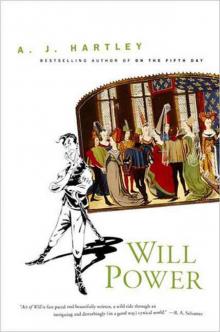 Will Power
Will Power Firebrand
Firebrand A Novel
A Novel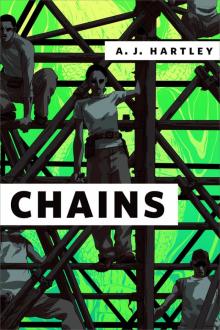 Chains
Chains Guardian
Guardian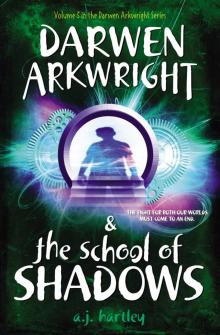 Darwen Arkwright and the School of Shadows
Darwen Arkwright and the School of Shadows Act of Will
Act of Will Darwen Arkwright and the Insidious Bleck
Darwen Arkwright and the Insidious Bleck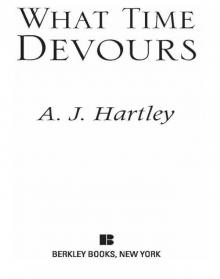 What Time Devours
What Time Devours